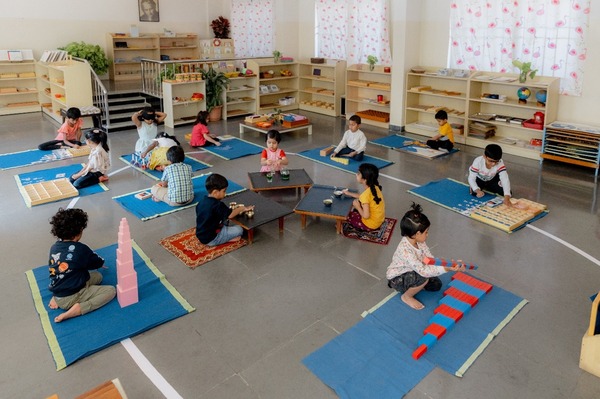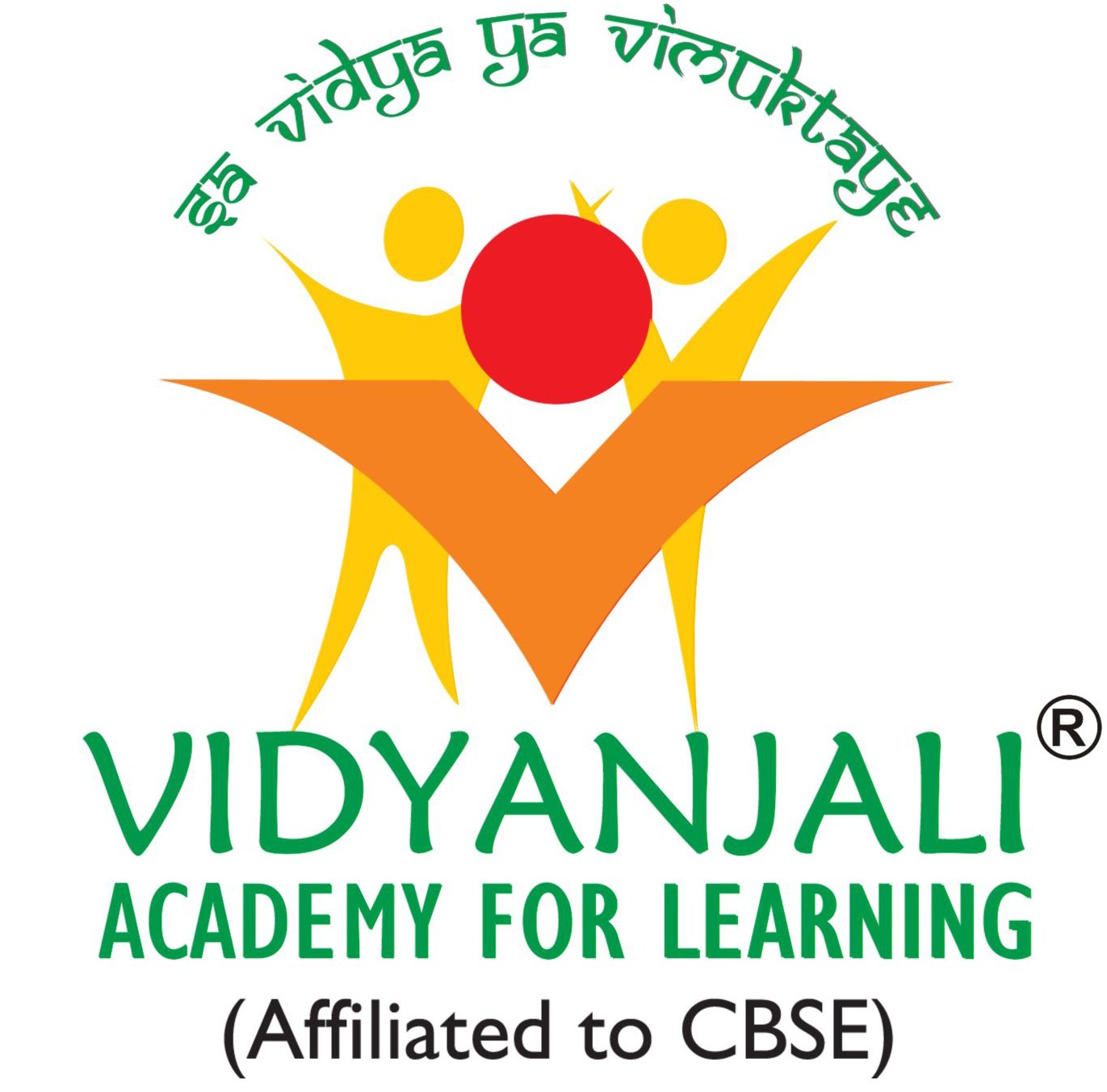
Vidyanjali Academy was established in 1992 by the Sri Ramaiah Reddy Educational Trust. For several decades, the academy has adopted the Montessori approach, which promotes independent learning and creativity supported by a strong sense of community for its students.
What
makes a Montessori education unique is that it stresses all hands-on
activities. Vidyanjali Academy manifests this principle and conducts classes
wherein children can learn and grow in a stress-free environment.
As
children learn best when left to discover, Vidyanjali Academy has used
Montessori concepts in its teaching methods for years. Hence, step into the
classrooms of Vidyanjali Academy and learn why its Montessori program is one of
a kind.
Understanding Montessori Education
Montessori
education is an educational approach developed by Dr. Maria Montessori during
the early years of the 20th century for the holistic development of children.
It is based on independence, freedom within limits, and respect for a child's
natural psychological, physical, and social development. Montessori classrooms
are designed to cater to each child's needs and learning styles, which allows
them to learn through exploration and discovery.
Unlike
traditional education, which is frequently characterized by teacher-centered
instruction, Montessori education is student-centered. Students in a Montessori
classroom are free to select what they prefer to do and work at whatever pace
they choose on self-directed, hands-on activities. The teacher does not
directly instruct but acts rather as a guide for students.
Key Principles of Montessori Education
The basic principles of Montessori education include:
●
Child-Initiated Learning: The activity
will be picked by the child that relates to the closest interest, giving them
personal initiative at their own pace and encouraging them to be independent
and self-motivated
●
Hands-On Learning: Specially designed
materials allow the child to experience concepts firsthand, aiding in building
a deeper understanding.
●
Mixed-Age Classrooms: There will be a
mix of different ages in the classroom, and the older ones will act as role
models to the younger ones. This will encourage social skills and peer learning.
●
Prepared Environment: Classrooms are
designed to invite discovery and self-management. They have available materials
and clear, organized spaces that meet children's needs.
Classroom Environment
The classrooms at Vidyanjali Academy are vibrant and
represent the entire philosophy of the Montessori approach. Every room is very
well arranged, with different learning stations set to care for different
subjects and skills. Such skills include language, mathematics, sensorial and practical life activities, equipped with the
proper Montessori material which inspires a child to learn and exercise
self-directed learning skills.
●
Everything has its proper place
so that children can easily find what they need. The environment is
child-sized, with low shelves and furniture to encourage independence.
●
There is an open floor plan to
encourage movement and collaboration between students. The overall calm and
neutral color theme helps children focus more on their activities.
●
The materials in a Montessori
classroom vary from wooden blocks to counting beads, language cards, and
geography puzzles.
Vidyanjali Academy has material selection based on
student developmental needs. These are constantly updated throughout the year
to avoid repetition in learning.
Montessori Classroom Structure For Different Age Groups
Vidyanjali
Academy follows the Montessori principle of mixed-age classes. In this, the
smaller children learn from their elder brothers and sisters, while the elder
students gain by being role models and helping out their younger peers.
The
classes are divided into age groups, like Pre-Primary for 3 to 6 years and
Primary Montessori for 6 to 9 years, respectively, with different activities
and materials according to the developmental stage.
Daily Routine within the Montessori Classroom
The
Montessori student's day at Vidyanjali Academy starts with a morning circle,
where the students gather to greet each other. Then, they can choose to spend
time at any number of learning stations in mathematics, language, science, or
any practical life skills.
At
Vidyanjali Academy, there are stretches of uninterrupted work time in the daily
schedule. The children are thus free to explore things very deeply without
being constantly interrupted. The school majorly emphasizes hands-on learning,
where the child interacts with the material and works at their own pace.
Teachers observe and guide only when necessary, keeping in mind that this is a
child-led activity.
Incorporation of Play Into Learning
The
life of a Montessori child is nothing but play, and Vidyanjali Academy
effortlessly integrates it into pedagogy. For Montessori, playing is learning,
and activities are oriented both towards fun and learning. Whether it is
building blocks or playing with sand and water, all that matters is how his
imagination works to its fullest and how he develops problem-solving skills
through play.
Role Of Outdoor Activities
The
Montessori curriculum of Vidyanjali Academy offers the most important element
for outdoor activities. It believes that nature forms part of one's learning
and provides opportunities for children to explore, observe, and connect with
their surroundings.
As
part of play activities, students play in gardens, play in the sand, or watch
natural elements to learn about outdoor play. This supports growth in physical,
emotional, and intellectual performance.
Curriculum and Learning Approach
Vidyanjali
Academy follows a Montessori curriculum that gives children the chance to study
the most extensive subjects, such as language, mathematics, science, geography,
and practical life skills. All of the subjects mentioned above are initially
introduced by conducting hands-on activities. Children may use counting beads
to learn mathematics, and they may be involved in sensory activities for
language development.
No
student at Vidyanjali Academy is hurried to fulfill a deadline from time to
time. Instead, they are encouraged to relax, pursue their current interests,
and master skills at their own pace as long as their joy for learning and
confidence blossom during the process.
Curriculum Transitions From Pre-Primary To Primary Montessori
As
the child progresses in the Montessori program at Vidyanjali Academy, the
curriculum builds up to meet the varied developmental needs of the growing
child. Skills for the foundation are built with language and fine motor, but
more importantly, socialization in the Pre-primary stage (3-6 years).
Students
evolve into more difficult subjects like math, science, and geography, but with
greater emphasis on developing skills in critical thinking and problem-solving
abilities in the Primary stage of 6-9 years.
Role Of Hands-On Learning In The Curriculum
Vidyanjali
Academy has a classroom full of materials to explore concepts by touch,
manipulation, and experimentation. Whether working with counting beads, pouring
water, or building models, students learn by doing. This helps them retain
information and develop a deeper understanding of the subject matter.
Role of Teachers
Montessori
teachers at Vidyanjali Academy are highly trained practitioners with
specializations in their respective Montessori qualifications. This ensures
that a child passes through the Montessori curriculum under the eye and
expertise of a trained teacher educator. Teachers are also encouraged to
continue with ongoing professional development through workshops and seminars
to keep abreast of best practices in Montessori education.
Moreover,
teachers act more like facilitators rather than lecturers. Teachers observe
students while they practice their work.
They only intervene where the child cannot correct themselves. The
children learn to discover things for themselves. Through these observations,
it is also possible for the teacher to have planned a lesson on something that
would work for the child's developmental needs and interests.
Teacher-to-student Ratio in Montessori Classrooms
Vidyanjali
Academy maintains a low student-teacher ratio and gives individual attention to
every child. The Montessori classrooms have a student-teacher ratio of
approximately 2 teacher for 30 students. This minimal student-teacher ratio
enables the teachers to observe the students closely and guide them very
personally, all while promoting a well-crafted learning environment.
Student Experience
For
many students, Montessori's classroom learning environment provides a
refreshing change from traditional teaching. At Vidyanjali Academy, students
quickly adapt to the freedom and independence that Montessori offers.
●
Students learn to take
responsibility for their learning, make choices about their activities, and
collaborate with peers.
●
In addition, Vidyanjali Academy
students have received the most significant survival skills in life, such as
problem-solving, critical thinking, time management, and social skills.
●
The practical life activities
promoted include caring for the environment, preparing snacks, and assisting
other students, which encourage independence and accountability.
Montessori Approach to
Fulfill Students’ Future Endeavors
The
Montessori-based education at Vidyanjali Academy trains the child's mind to
acquire knowledge, develop critical thinking skills, and develop an attitude
toward independence. This program's hands-on and self-paced nature helps the
child master core subjects while fostering imagination and curiosity.
Generally,
the intrinsic motivation and good work habits of children who receive
Montessori-based education make them do well in other future academic
endeavors.
Parental Involvement
Vidyanjali
Academy believes that a child needs to learn from their parent. Therefore,
regular parent-teacher meetings are taken through workshops and events to
facilitate the parents. This makes them understand the philosophy behind
Montessori and what is happening in the development progress of the child. The
communication between the two parties remains open so that parents become
better informed and are actively involved in the learning process of their
child.
In
addition, Vidyanjali Academy provides ample opportunities for parent-teacher
communication, including monthly progress reports, parent-teacher conferences,
and informal check-ins. The institute encourages parents to ask questions and
provide feedback in a collaborative approach to their child's education.
Success Stories
Parents
from the Paes, Vasa, and Mariyappan families praise the Montessori program for
its holistic approach to child development. They highlight the personal
attention, warmth, and strong values instilled in their children.
Students
at Vidyanjali Academy, like those from the Vasa and Mariyappan families, have
not only excelled academically but have also developed valuable life skills.
From independence to critical thinking, the Montessori system has equipped them
with tools for success, including strong self-confidence and leadership
abilities.
Why Choose Vidyanjali Academy’s Montessori Program?
Vidyanjali's
Montessori program focuses on all-round development, so a child gains in terms
of academics and personal development. The school environment encourages
independence and curiosity, and teachers devote individual attention to all
students, which lets children not only in academic areas but also the social
and emotional ones.
●
We recruit experienced,
well-trained teachers who will stay for a long time, providing a more
predictable, loving environment.
●
A low student-to-teacher ratio
ensures every student receives personal attention for learning.
●
With regular parent-teacher
meetings and open houses, the Montessori program turns out to be responsive and
effective.
●
The students who come to
Vidyanjali's Montessori program develop critical life skills such as
independent thinking, problem-solving, and collaboration.
Final Thoughts
The
Vidyanjali Academy provides an innovative learning experience through its
Montessori classrooms. Students are encouraged to explore and discover through
hands-on learning, independence, and community. This serves as a great
foundation for lifelong learning and academic success at Vidyanjali Academy.
Parents
who want an educational experience that promotes their child's natural
curiosity and love for learning may find the Montessori program at Vidyanjali
Academy a great option. To learn more about the admission process and your
queries, contact us at info@vidyanjali.in.
Frequently Asked Questions
1. What age groups are served
by the Montessori program at Vidyanjali Academy?
Vidyanjali
Academy offers Montessori education from 2.5 to 6 years of age. It is a
well-structured nurturing space designed to support those foundational years
and give young minds independence, creativity, and a love for learning.
2. How does the admission
process work for the Montessori program?
Parents
interested in the Montessori program can apply through the school’s admission
office. The process typically includes:
●
A visit to the school.
●
Interaction with the teachers.
●
An assessment to ensure that
the Montessori environment is a good fit for the child.
3. What are the fees
associated with the Montessori program?
The
fee structure for Vidyanjali Academy’s Montessori program varies depending on
the child's level and other factors. Parents are encouraged to contact the
school directly to receive detailed information on the program’s fees.



